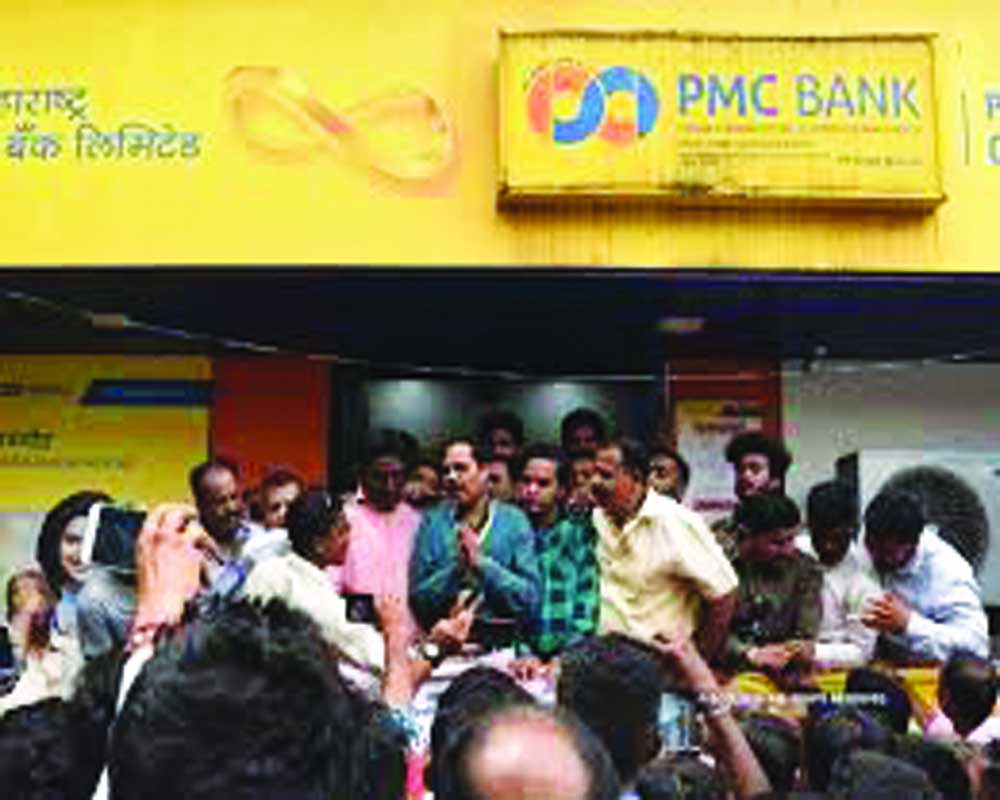Considering the impact on savings of ordinary mortals, cooperative banks need to be part of the RBI’s strictest vigil
The extent of a crisis is not felt until it impacts human lives. And the stress felt by account-holders of the now collapsed Punjab and Maharashtra Cooperative (PMC) Bank became all too evident when three depositors died, two out of anxiety-induced cardiac arrests and one committing suicide. The desperation becomes palpable as cooperative banks have ordinary individuals parking their savings of a lifetime with them, usually small businessmen, farmers, retired professionals and even cooperative group housing societies. Basically, honest people, who want to make sure that they get by life on a rainy day under the safety net of a bank and breathe easy risk-free. Now they’ve found their lives and trust completely overturned. While unscrupulous businessmen and scamsters — who have made good by defrauding big banks and fled to safe havens — have left public banks red-faced, the Rs 4,355 crore PMC scam has been more intensely felt simply because the neighbourhood bank suddenly doesn’t seem at all trustworthy. It has shaken what welds a community, faith. Of course, the Government has stepped in to assure account holders and a regulatory mechanism is kicking in with fury. But why were signs being ignored for such a long time and actionable triggers allowed to pile up? According to Reserve Bank of India’s (RBI’s) own data till March 31, 46 of the 1,542 urban cooperative banks had built up liabilities and 26 were ticked off. Also, RBI itself had been putting some of these banks under severe restrictions all too frequently, indicating a cascading malaise that ought to have been acted upon strictly. This year itself, RBI had red circled four cooperative banks and restricted them between January and September, PMC included. The bank had a deposit base of over Rs 11,000 crore, reported a net profit of nearly Rs 100 crore even though its non-performing assets (NPAs) more than doubled. Yet nobody considered the last as a travesty or had foreseen the precipice. With the alert mode off, officials continued their dubious lendings to one group, HDIL, despite its falling fortune.
What is alarming is that the fraud actually began from 2008 with many of the bank’s senior employees involved in creating fictitious accounts to loan money without scrutiny. PMC chairman Waryam Singh was a board member of HDIL and even though RBI sought his removal in October 2018, there was no follow-up crackdown. Such oversights and laxity led to a sharp rise in NPAs that eroded a small bank’s profits. Even the State Government wasn’t aware though the crony capitalism between banks, politicians and businessmen is not new and this nexus, too, is expected to reveal some important beneficiaries. Clearly, there is a need for an incisive regulatory mechanism that doesn’t allow for the slightest oversight and becomes a trigger for corrective action. Even if a regulatory check is in place, poor governance and professionalism and an aversion to technological processes that guarantee transparency have kept smaller banks out of a codified protocol. That carelessness needs to be done away with right now at the micro level. A phased withdrawal quota, so that depositors can take their money out, or cancellation of licence when the damage has been done, cannot be the solution. Investors, too, need to watch out for the fundamentals of such banks than just falling for the relatively higher rates on deposits offered by them over commercial ones. They should remain vigilant about a bank’s capital base, see that it hasn’t dipped to negative. Other safety nets, of course, include the Deposit Insurance and Credit Guarantee Corporation of India scheme. But the insurance limit here is only up to Rs 1 lakh. There is no guarantee for the rest of the depositor money in case of failures. Of course, the government of the day has predictably resorted to a blame game with Finance Minister Nirmala Sitharaman admitting that all public banks were allowed to continue fraudulent practices because of “phone call” recommendations in the UPA regime. The issue has further gained traction with Nobel-winning economist Abhijit Banerjee predicting that PMC was just the “tip of the iceberg”, that the government simply does not have the bandwidth to write off loans and rescue ailing banks and that it should, therefore, sell them off. But cooperative banks by their very nature are not meant to look like a corporate behemoth but inculcate a habit of banking among unserved sectors. There will always be a social dimension to look into and, therefore, greater accountability must not be just monitored but embedded and made systemic.


























